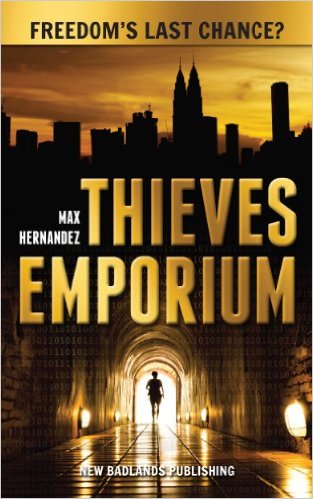|
I have a lot of notes pertaining to Utopianism. As a disillusioned and reformed utpoian (of the communist persuasion), I find it important to make a compelling and expansive case against utopia and the evils committed in the pursuit of such. I came across this gem a while back while looking for material related to the subject. This article on "Libertopia" is a very good precursor to a post I hope to get in before December concerning utopiainism and all of the difficulties with such a pursuit. Anyone who thinks anarchism is inherently utpoian does not understand utopia and does not understand anarchism. This article does a good job of clearing up those issues.
0 Comments
Today's resource suggestion is a short and entertainingvideo with a very strong point that is made. I think there may be some metaphysical commitments hiding in the video that I don't agree with, but those disagreements are immaterial to the case presented.
About once a month, someone who knows me (usually from the summer camp I used to work at) asks me, "how can a Catholic be an anarchist?" I usually use this prompt as a pretense for reuniting with old friends, catching up, and seeking out a novel perspective on my beliefs. It's interesting to see how much and how little my beliefs and the beliefs of my friends have changed over time.
Given the Church's history of manipulating politics, choosing and overthrowing kings, burning "heretics" at the stake, and attempting to dictate the very nature of the universe, it would make sense, at face value, that an anarchist would reject the Church as just another state. I have a few blog posts waiting in the wings that address these issues but, for now, I will call upon the work of others to begin the discussion. What's important is holding the Church to the moral standard set out by it's philosophy. Where I can reject the government of Empire (the USA) based on the philosophy enumerated and expressed in the Constitution and the actions of the "Founding Fathers", that same opportunity is drastically diminished, if not impossible, with regards to the Church. This article begins to explore this reality.
Today's resource is something a little less topical and a little more important the the Pope's bad science.
The Tragedy of Enforcement is something that bothered me for the longest time. Even back in my commie days, I was faced with the tragedy of enforcment. For this reason, I was enthralled with cybernetics, as it seemed to be a useful tool for "tricking people into" voluntarily doing "the right thing", so as to avoid turning to the constant use of lethal force and coercion "for the common good". Of course, cybernetics presents its own ethical issues that are far more complex and destructive than even the tragedy of enforcement. Ultimately, (mostly on my own), I came to realize that there is no solution to the tragedy of enforcment. One must either become a moral nihilist or reject the use of enforcement. This was one of the key elements in my journey to anarchism. All this is just supposed to contextualize the role that videos like this could have played in my awakening, and may play in that of others. I got a little bit of push-back at the end of last week for my Pope-related resource suggestions. Interestingly, I think the push-back came from the only two people that read that suggestion, and I doubt they actually read the articles, just the comments I had concerning them. I'm not sure if they've read previous main blog posts I've made, specifically ones defending the Pope and the papacy or those concerning epistemic rectitude.
I have already written more extensively than I really desire to concerning the Pope and the papacy, but that push-back (and arguments on social media) ought to be addressed. Rather than writing (and writing, and writing) about a subject that is superfluous to philosophical inquiry, I think I will outsource my arguments concerning Catholic social teaching, encyclicals, and the capricious foundations of the Church in politics. There could be no-one better suited to take on the task than Tom Woods. In Episode 497 of the Tom Woods Show, Tom addresses many of the issues I have brought up before, concerning the relationship between Doctrine and political considerations, the nature of authority and infallibility, and the relationship between epistemology and ethics. Anyone who has an opinion on Pope Francis' soundbites or "encyclical" ought to listen to this short podcast and read the resources linked in the show notes. In my resource suggestions (and work in general), I try to avoid chasing whatever is topical that day or week. Instead, I try to focus on central and unmovable philosophical foundations. But this Pope visit is somewhat important. Addressing congress personally (while demeaning to the position of the pope, it is a thing that happens), Francis opted to ignore the murder-machine fueled by theft that is the United States' Government and talk about global warming in a naive and uninformed manner. Instead of calling for conversion away from the culture of death and subjugation, he called fore more death and more subjugation in the name of protecting a rock floating in space. I recommend that anyone, before uncritically gulping down the pope's rhetoric, one ought to educate themselves with regards to the material he addresses. In line with that recommendation, I provide you with a short exhortation to learn economics before assuming "global warming is a thing and it's all capitalism's fault," as Francis claims. I also have here a super-brief and very simple explanation of the basics, which Francis sees to have missed out on somehow. This issue is very, very important. The Church has withstood the test of time due to two factors: willingness to admit fault when caught teaching or acting outside of accordance with the truth, and assuredness in Doctrinal Truth. When people confuse different classes of assertion (Doctrinal Truth vs. practical consideration), they tend to discover the Church's spotty track record with regards to practical considerations (RE: Catholic social teaching) and throw out all of Doctrine due to a category mistake.
The Pope, in preaching empirically false and logically impossible teachings, is likely to attract lukewarm converts who are radically divorced from reality while chasing away rational and virtuous Catholics, especially when both the pope and those receiving his message fall into the category mistake of believing everything the Pope says, instead of critically assessing his teachings and discerning between Doctrine and practical consideration. The time has come, I think, to purge some podcasts off my list. I have more podcasts than I have time, and some of them have ceased providing utility for my current situation... which happens a few times a year. Usually, when this time comes, I share on facebook the ones that I am abandoning and why. Now that I have a platform on which I talk about podcasts incessantly, I figure this may be a better place to do so.
Podcasts I continue to listen to (in order of priority):
Podcasts I no longer listen to:
Podcasts that have been discontinued:
Today's resource suggestion is another book. This one is available on amazon for purchase or, for free, in unabridged installments at The Daily Bell. It is a fun novel which explores real technology, real cultures, and provides the reader with a new way of looking at the world and a set of actionable options for improving one's quality of life.
To call Thieve's Emporium a work of science fiction would be unfair. While it somewhat defies genre, I guess it could be considered an educational drama? The characters are largely fictional, but what they face and what they do are largely non-fiction. I don't want to spoil too much of the plot, and I have not quite finished the book yet, but I strongly recommend people read this book. With unlikely sympathetic characters in a world that is designed to marginalize them, and a slew of philosophical, moral, and ethical discussions that can and should be sparked by this work, It's certainly a good way to spend a lazy weekend.
Everyone should know by now that I'm morally opposed to taxation in all its forms. Many don't quite understand why that is the case, and those that do tend to disagree based on utilitarian reasoning. If someone has seen my arguments on facebook, read this blog, or spoken to me in person for even fifteen minutes, and still do not understand my moral opposition to taxation, there is nothing I can do to help him.
The difficulty with utilitarian justifications (for anything, not just taxation) is that it compartmentalizes individual actions. Why is it moral to abort Hitler but immoral to abort someone else's baby? Why is it immoral to mug a guy in a back-alley (assuming you don't really, really need that money) but it is moral to take a percentage of their hard-earned wages against their will? Utilitarian thought obfuscates moral and ethical considerations with a certain pragmatic results-oriented thought in which a perceived end can justify any action. One useful tool to double-check utilitarian arguments for rectitude is to find the logical form of the argument being made and replace terms with functionally equivalent terms and see if the argument still matches one's intuition. Sax and Violence is an excellent, artful, and cogent demonstration of this approach to double-checking a utilitarian argument. There are those out there who will find that both taxes and saxes match their intuition... and those people terrify me. There are those that will discover that both taxes and saxes are counter-intuitive after reading this article, as well. However, it would take an act of willful ignorance to say that one is morally justified whilst the other is not. You can watch a video that has a reading of the text and a further exploration of the idea, but the audio quality is a little shoddy. After nearly a week of silence, I have more suggestions and I will have a full post out this weekend.
Today, I recommend this short piece about effective charity work. It's published by Philanthropy Roundtable, an organization focused exclusively on researching and promoting effective charity work. While their work sometimes borders on leftism and puritanism, depending on the author and editor, there is a lot of good work and truth that comes out of the Philanthropy Roundtable. I have only recently discovered this website, but I have found a lot of support for arguments I have been making for a good time now, and some food for thought concerning things I haven't considered before. I don't agree with everything on the site, or even in today's suggested article, But it certainly has more to work with than what I hear most often... and I work for the world's most prolific and successful charitable organization. Just think what could happen in the Catholic Church if they were to approach the corporal works of mercy from an angle that has been empirically shown to be more effective than an 1,500 year old socialist welfare program. Work is the Best Charity for the Poor Presents an argument that resolves many of the issues I have had with missionary work upon my return from Mexico and closely parallels my understanding of prisons and exile in a free society, which will be an upcoming full-post. |
Archives
October 2015
Categories
All
|





 RSS Feed
RSS Feed
